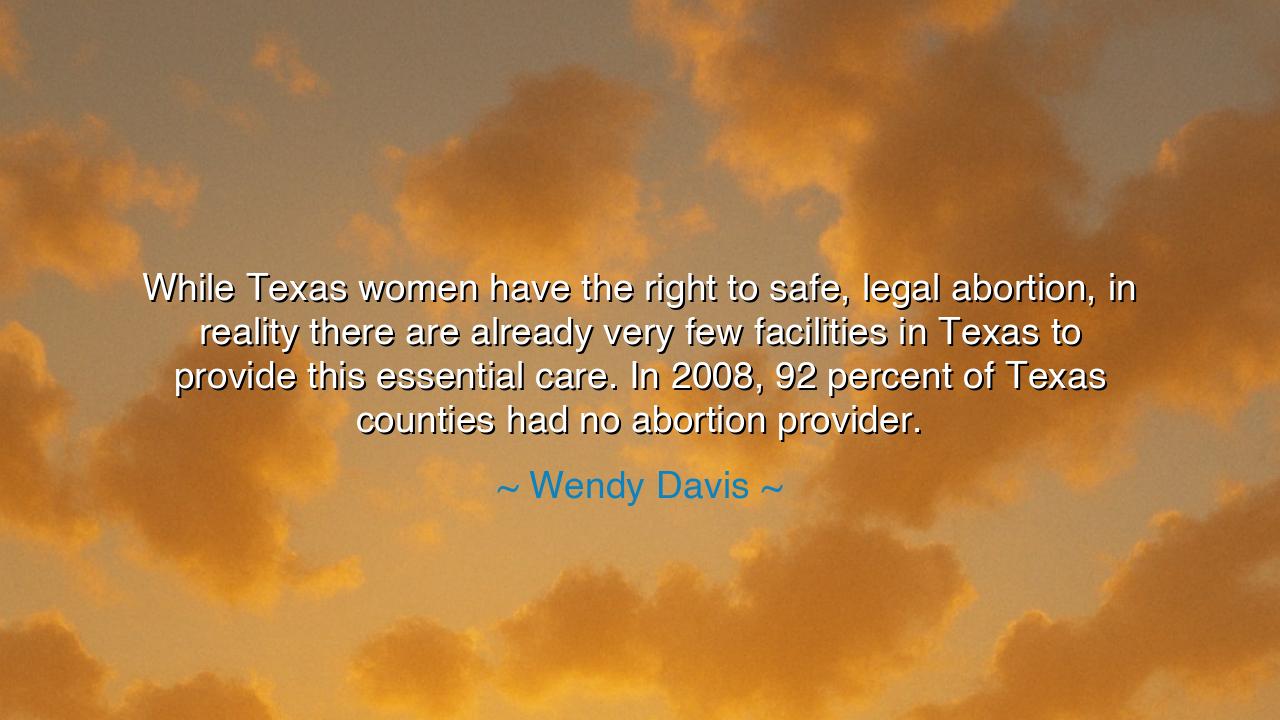
While Texas women have the right to safe, legal abortion, in
While Texas women have the right to safe, legal abortion, in reality there are already very few facilities in Texas to provide this essential care. In 2008, 92 percent of Texas counties had no abortion provider.






When Wendy Davis declared, “While Texas women have the right to safe, legal abortion, in reality there are already very few facilities in Texas to provide this essential care. In 2008, 92 percent of Texas counties had no abortion provider,” she spoke as one who stood at the crossroads of law and lived experience — a place where the promises of justice often crumble under the weight of reality. Her words expose a painful paradox: that a right without access is no right at all. She speaks not only for the women of Texas, but for all who have watched the law declare liberty while the world denies its practice.
The origin of this quote lies in Davis’s long struggle for women’s reproductive rights, particularly her historic 2013 filibuster in the Texas Senate, when she stood for over eleven hours to block a bill that would have further restricted abortion access. Her statement points back to the years leading up to that moment, when state laws — though not banning abortion outright — had choked it through regulation, forcing clinics to close and leaving entire regions without care. In 2008, as she noted, 92 percent of Texas counties had no provider. This was not an accident of geography; it was a consequence of political intent — a system that proclaimed legality but engineered impossibility.
Her message reaches beyond politics into the heart of moral philosophy. It recalls the ancient truth that justice is not fulfilled by words written on parchment, but by deeds enacted in the world. The philosopher Aristotle once said that the purpose of law is not merely to command, but to ensure the good life for all citizens. Yet when the law proclaims freedom without providing the means to exercise it, it betrays its own purpose. Davis’s lament is, in essence, an indictment of hypocrisy — of a system that pretends equality while maintaining control. The law said “you may,” but the land replied “you cannot.”
There is a historical echo here in the struggle of African Americans after the Civil War, when the Constitution promised liberty and the vote, but poll taxes, literacy tests, and terror made those rights hollow. A right, denied in practice, becomes a ghost — it haunts the nation with its absence. Just as those citizens were told they were free yet found no path to exercise their freedom, so too were Texas women told they had legal autonomy but found no doorway through which to claim it. Davis’s words remind us that oppression often survives not by open chains, but by quiet barriers — distance, bureaucracy, and silence.
Her statement also carries the sorrow of geographic inequality, the cruelty of distance as a moral weapon. For a woman in rural Texas, hundreds of miles from the nearest clinic, the journey itself became a test of endurance — financial, emotional, spiritual. Here, Davis speaks as both lawmaker and witness, as one who saw that the gap between “safe and legal” and “accessible and real” is not merely a gap in policy, but in compassion. When rights depend on wealth or location, they cease to be rights and become privileges.
But Davis’s tone, though mournful, is not hopeless. Beneath her statistics beats the defiant heart of reform — the belief that awareness is the first step toward justice. Like the prophets of old who cried out against kings and courts, she uses truth as her sword. By naming the numbers, she names the pain. By naming the pain, she exposes the system that sustains it. Her words stand as both testimony and summons — to awaken the conscience of the people and remind them that liberty must be guarded not just in the courts, but in the daily structures of life.
The lesson her words impart is this: never mistake the existence of a law for the presence of justice. The ancients taught that justice is a living flame — it must be fed by vigilance, compassion, and courage. It is not enough for the law to say “you are free”; society must build the roads, open the doors, and protect the weak so that freedom can be lived. For every right denied in practice, a civilization loses a measure of its soul.
And so, Wendy Davis’s words endure as both a warning and a call. They remind us that rights must be lived to be real, that equality without access is illusion, and that the measure of a society lies not in what it declares, but in what it delivers. The ancient duty remains the same: to stand for those whose voices are drowned by distance, to build the bridges that make justice reachable, and to ensure that no law, however noble, becomes an empty promise upon the wind.






AAdministratorAdministrator
Welcome, honored guests. Please leave a comment, we will respond soon